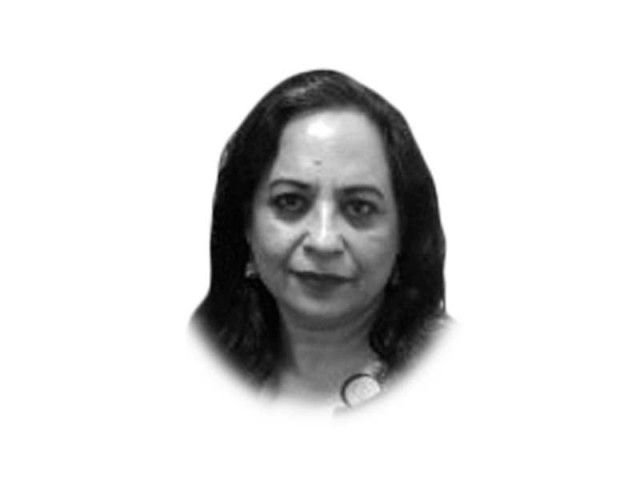Democracy in Pakistan — conspiracy against or erosion?
The current political environment portrays Pakistan as an example of Huntington’s third wave democracy

The writer is a former lecturer of international relations at Quaid-e-Azam University, Islamabad and Loyola University, Chicago. The views expressed here are her own.
Democracy has not been derailed nor seemingly is there a threat to democracy at the moment but there are serious challenges for the ex-PM with reference to core essentials of democratic norms. Equating any personal challenges regarding transparency, accountability and good governance with a “threat to democracy” is indicative of personality-based politics and a weak internal democratic structure within political parties along with a disregard for the rule of law. This approach on behalf of elected leaders is not only dangerous for democracy, but it also creates a lot of confusion in national and international circles and makes experts on Pakistani politics raise concerns about the erosion in public support for democracy. This concern however, is not valid as the people of Pakistan have made huge sacrifices for the restoration of democracy at different points in time; against the dictatorial regimes of Gen Ayub Khan, Gen Ziaul Haq and Gen Pervez Musharraf. Specifically during the most tyrannical rule of Gen Zia when a large number of Pakistanis (many in their prime youth) were behind bars, persecuted and executed.
This commentary advances on the proposition that there is no erosion of public support for democracy in Pakistan, but there is an erosion of democracy, as Samuel P. Huntington theorises, by the “political leaders and groups, who win elections, take power, and manipulate the mechanisms of democracy to curtail or destroy democracy.” Further to reinforce the argument, the current military doctrine of nonintervention in politics since 2008 has rather revolved around support for the democratic system, ensured that the governments complete their full terms and helped in conduct of free and fair elections. For example, many heard the sound of boots behind the Pakistan Tehreek-e-Insaf’s 2014 dharna, but ultimately they diminished and the elected government came out on top much stronger.
The current political environment portrays Pakistan as an example of Huntington’s third wave democracy, where the threats to democracy are “likely to come not from generals and revolutionaries…but rather from participants in the democratic process,” thus the threat is not of an ousting but of a gradual erosion of democracy and democratic principles.
Erosion of democracy in Pakistan can be explained basically by the lack of strengthening and promoting democracy in the post-democratisation period. The first-ever smooth power transition in 2013 from the PPP to the PML-N “was a game changer which greatly reduced the chances of an abrupt government change in Pakistan,” according to South Asia expert Marvin Weinbaum. The smooth power transition is an essential constituent in the process of democratisation. However, beyond democratisation, consolidation and strengthening of democracy remains the most essential task to avoid a reversal, or a step back, especially in countries like Pakistan whose checkered political history has seen several abrupt government changes in the past.
Unfortunately the post-2008 era, according to the Jinnah Institute, was “marked by poor governance, persistent adversarial relations between the executive and the judiciary, allegations of corruption and the inability of the political leadership to build consensus to combat terrorism.” Similarly, gradual deterioration of the quality of democracy was also reported by Pakistan Institute of Legislative Development And Transparency (Pildat) in its report, The Assessment of the Quality of Democracy in Pakistan, June 2013-December 2014. The report studied 18 months of the PML-N government and concluded that it was “weak performance of the elected Government that dented the credibility of democracy as a system that ensures good governance.” Further, the latest report from Pildat does not depict optimistic picture for democracy either. The quality of democracy in Pakistan in the year of 2016 scored by Pildat is 46% which is 4 per cent below the score it received in 2015.
The current political turmoil in Pakistan once again has generated speculations and a big question mark on the quality of democracy and the effectiveness of the democratic institutions in Pakistan. It was after the miserable failure of all the democratic institutions that the Supreme Court had intervened in the Panama Leaks case. In the overall institutional failure the very first failure came from the parliamentary party PML-N itself. Due to the personality factor of Nawaz Sharif and the lack of intra-party democracy, there was no accountability from within. Equally disappointing was the role of other institutions such as the supreme democratic institution — Parliament — that could not hold its own leader accountable; the inability of the political parties to agree on ToRs; and the performance of the National Accountability Bureau (NAB).
Instead of working towards celebrating democratic consolidation and effective functioning of key democratic institutions, unfortunately, on its 70th independence anniversary Pakistan is still in the process of defining the roles of institutions as the Senate is in the process of holding intra-institutional dialogue to prevent the collision of state institutions. Yet, on the other hand, the controversial reference against the Supreme Court by the National Assembly speaker, and the defiance of NAB by the Sharif family tell a different story and indicate clearly that there could be a collision of state institutions which may lead to further erosion of the path to sound democracy.
Published in The Express Tribune, August 25th, 2017.
Like Opinion & Editorial on Facebook, follow @ETOpEd on Twitter to receive all updates on all our daily pieces.















COMMENTS
Comments are moderated and generally will be posted if they are on-topic and not abusive.
For more information, please see our Comments FAQ